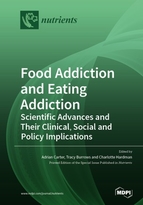Food Addiction and Eating Addiction: Scientific Advances and their Clinical, Social and Policy Implications
A special issue of Nutrients (ISSN 2072-6643).
Deadline for manuscript submissions: closed (31 July 2019) | Viewed by 90759
Special Issue Editors
Interests: addiction; ethics; public policy; neuroscience; mental health; stigma; discrimination; self-effiacy
Interests: dietary assessment; biomarkers; obesity; addictive eating
Special Issues, Collections and Topics in MDPI journals
Special Issue Information
Dear Colleagues,
There is a growing view that certain foods, particularly those high in refined sugars and fats, may be addictive and that some forms of obesity can usefully be treated as a food addiction. This perspective is supported by an expanding body of evidence from animal studies, human cognitive neuroscience, and brain imaging. Obese and overweight individuals also display patterns of eating behavior that resemble the ways in which addicted individuals consume drugs. Scientific and clinical questions remain: Is addiction a valid explanation of excess weight? Is food addiction a behavioural (i.e., eating) or substance (i.e., sugar) addiction, or a complex interaction of both? Should obesity be treated as a food addiction? Should we distinguish food addiction from other forms of disordered eating like Binge Eating Disorder? It is also unclear what impact food addiction explanations might have on the way in which we think about or treat people who are overweight: what impact will a food addiction diagnosis have on individuals’ internalised weight-bias, stigma, self-blame, and belief in their ability to lose weight? Should some foods be regulated like other addictive commodities (i.e., alcohol and tobacco), whose advertising and sale is restricted, or like certain foods, which are taxed? This Special Issue will cover a range of scientific, clinical, social, and policy questions raised by the concept of food addiction.
Assoc. Prof. Dr. Adrian Carter
Assoc. Prof. Dr. Tracy Burrows
Dr. Charlotte Hardman
Guest Editors
Manuscript Submission Information
Manuscripts should be submitted online at www.mdpi.com by registering and logging in to this website. Once you are registered, click here to go to the submission form. Manuscripts can be submitted until the deadline. All submissions that pass pre-check are peer-reviewed. Accepted papers will be published continuously in the journal (as soon as accepted) and will be listed together on the special issue website. Research articles, review articles as well as short communications are invited. For planned papers, a title and short abstract (about 100 words) can be sent to the Editorial Office for announcement on this website.
Submitted manuscripts should not have been published previously, nor be under consideration for publication elsewhere (except conference proceedings papers). All manuscripts are thoroughly refereed through a single-blind peer-review process. A guide for authors and other relevant information for submission of manuscripts is available on the Instructions for Authors page. Nutrients is an international peer-reviewed open access semimonthly journal published by MDPI.
Please visit the Instructions for Authors page before submitting a manuscript. The Article Processing Charge (APC) for publication in this open access journal is 2900 CHF (Swiss Francs). Submitted papers should be well formatted and use good English. Authors may use MDPI's English editing service prior to publication or during author revisions.
Keywords
- Food addiction
- Eating addiction
- Public policy
- Stigma
- Treatment
- Weight bias
- Obesity








